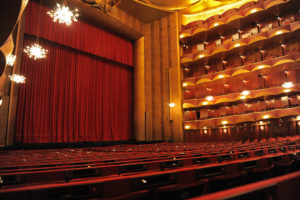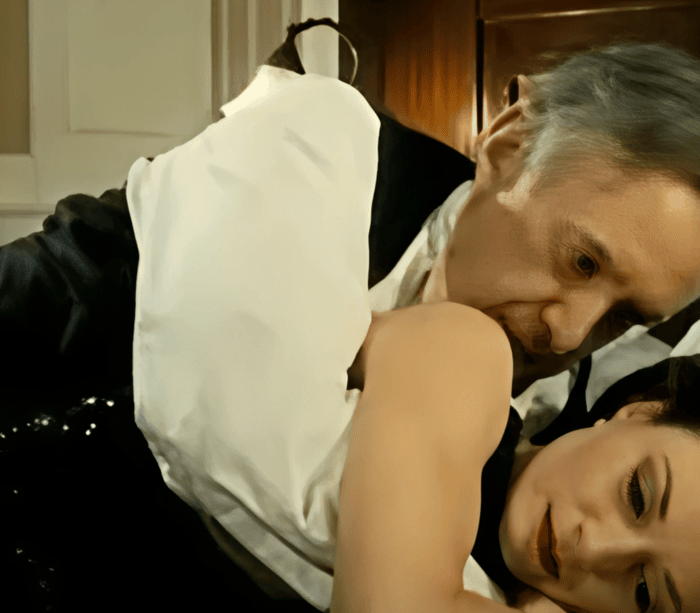
Met Opera General Manager Peter Gelb Takes Another Shot at Critics in NY Times Editorial on Making Opera New Again
By David Salazar(Credit: Jonathan Tichler / Met Opera)
“After 18 years running the Met, and a lifetime of experience in classical music and opera, it’s clear to me that the solution to sustaining opera is through artistic reinvention, both with new operas by living composers, and reimagined productions of classics that can resonate with audiences of today.”
So writes Met Opera General Manager Peter Gelb in his new editorial “How to Save Opera in America? Make it New Again” in The New York Times.
The statement itself makes a lot of sense, even though it adds little new to the table (and given his 18 years of running the Met, the fact this discovery has led to him having to make the historically infamous move of pulling from the Met’s endowment makes you wonder how much that knowledge has helped him to this point). The two main pillars of Gelb’s thesis are actions already being taken across the world.
Europeans having been re-imaging productions for decades and other companies in the U.S., as Gelb himself notes, have been championing works by contemporary composers.
Gelb is quick to note in his piece that new opera has been at the core of the American opera experience and credits “David Gockley, the visionary former leader of the Houston Grand Opera and later the San Francisco Opera, who commissioned 45 new operas, including Adams’s ‘Nixon in China.’ Smaller companies like American Modern Opera Company, Opera Philadelphia and Beth Morrison Projects have followed suit, winning new and younger audiences with modern compositions.”
He notes that the Europeans have been more cautious with new opera, but commends companies like “Vienna’s Volksoper, which recently presented the world premiere of ‘Alma,’ an opera about the life and loves of Alma Mahler, are taking more creative risks.”
But then the piece takes a turn when the Met Opera leader decides to bring in his new narrative crutch.
“Many companies, including the Met, are still trying to recover from the losses of the pandemic,” Gelb wrote.” “We are fighting to survive economically (our European colleagues are better off with substantial government funding), regain our artistic footing and secure new audiences and donors. This is particularly difficult to accomplish because for decades there has been resistance to substantial artistic change from administrators, academics and critics.” (Emphasis is mine).
This is where I take issue with the piece. Because it isn’t some valedictory statement to move forward but a veiled chastisement of the people he feels aren’t lining up with his agenda or treating his projects fairly. Otherwise, why even write the piece and give it such a negative bent?
“I arrived at the Met in 2006 with plans to re-energize its audience engagement through new productions of the classics and new operas, but I had to take it relatively slowly or risk shocking our longstanding subscribers and patrons. It wasn’t until we were shut down during the pandemic that I seized the moment for some wholesale change,” he writes before then noting recent accomplishments. Again, he sets up a statement of intent, but needs to find a way to throw those who oppose him, i.e. critics, to the curb.
“I can attest that these operas resonate with audiences. They respond with excitement and emotion. Critics, not surprisingly, are not always enthusiastic,” he writes (the “not surprising,” unsurprisingly gratuitous). “Reviews of new, unfamiliar work can be mixed, negative or at times dismissive. But history has proved time and time again that the status quo on artistic works is often wrong. When Puccini’s ‘Madama Butterfly’ had its premiere at La Scala in 1904, it was a critical flop.”
(One would think that with extensive experience and endless wisdom as the head of a major opera company that Gelb would not forget to remark that “Madama Butterfly” underwent revisions before becoming the hit it is today. The version the Met presents isn’t that 1904 premiere version. There were other operas that flopped and became renowned that would have been more adequate examples for his argument. This is disappointing given the resources and information a man in his position and with his experience would have in this regard.)
I won’t address the “operas resonate with audiences,” because ticket sales tell a different story, though admittedly, not the complete one. But it’s in his undermining of critics where Gelb’s entire argument implodes.
First off, a lot of operas have failed with critics initially before rewriting history. In fact, a lot of art has. Nothing new here. But how it happens is also important. As Gelb notes, companies like Beth Morrison Projects put out a lot of new work. Some of it gets amazing reviews and goes on to notable runs. Other works don’t quite have that impact. That’s also nothing new because not every single piece will be a slam dunk. And a company, like Beth Morrison Projects, for example, knows this and takes those risks regardless, because next year, they will continue to successfully do this. And opera benefits from it on the whole because new work and its creators are allowed to flourish in this environment. Creative risks are supported and championed. What we need are more companies with that model and approach.
That’s not the case with the Met and I can actually understand where Gelb is coming from here. There’s a ton of money invested in new productions and with that, the risk involved is heightened. Every opera HAS to justify its existence. It has to be successful. Otherwise, the money needs to be allocated differently. That’s just business.
But art doesn’t always work within the parameters of business and here’s where Gelb’s lack of understanding is frustrating. He seems to want people to only understand the business aspect of it and to just congratulate the Met for trying and give it a pass every time.
But the reality is that not every opera is a hit. Nor is every opera good. To pull from his playbook in this article, opera history has shown that of the thousands created, only about 100 (and that’s generous) works remain staples of the standard repertory. And that’s because a lot of them are simply not at the same level and don’t merit that investment. Gelb himself, as an administrator, wouldn’t bank on operas that are not of an acceptable level, regardless of the composer.
So the same goes here. Not every new opera is going to be good, just because you spent millions on it. And even if you believe in every fiber of your being that it is, a lot of people won’t agree with you. Just ask Hollywood. And there, you rarely see executives savaging critics for destroying a film before opening weekend, gutting its chances in the process. At least the critics aren’t publishing reviews based on dress rehearsals of an opera (though for a lot of second runs of revivals, that’s what we’re getting with the first official performance).
Not everyone gets a participation trophy and not everyone gets a pat on the back for spending a lot of money and trying. Even if you put all your eggs in a few baskets, there will be a few cracked ones.
The crazy thing is, this all seems reactionary to “Grounded’s” reception. Because otherwise, reviews for “Ainadamar” were positive. Ditto for “Fire Shut Up in My Bones.” And “Florencia en el Amazonas.” And “X: The Life and Times of Malcolm X.” And “The Hours.” I could keep going. In fact, I will. Per Show-Score, 62 percent of “Grounded’s” 21 reviews were positive with only 14 percent labeled as negative. As always with these aggregators, discretion and interpretation is necessary, but clearly “Grounded” wasn’t seen as a flat-out bomb by most.
Moreover, the Met’s marketing department makes ample use of critics’ comments when they are positive. Exhibit A on the company’s Instagram account:

And if you go to the Met Opera lobby and check out the new screens hanging by the box office, you will also often find critics’ positive reviews displayed.
So let’s be clear, the critics aren’t trying to stop the Met’s progress or new opera’s progress. In fact, we applaud it. When we love it, we lavish tremendous praise on it.
Here’s how I concluded the introduction to my review of “Ainadamar:”It’s opera, but it’s so much more than that. It pushes the boundaries of what an operatic theatrical experience can be. As I sat there experiencing it for the first time on Saturday, Oct. 19, 2024, I could not help but feel that I was witnessing something I’d never seen before on that stage.”
And other critics have shown similar enthusiasm for other new works.
Meanwhile, Gelb’s reaction to negative reviews in a sea of positive ones and his decision to dress up a positive piece in the most influential newspaper in the world as a means of blaming others for slowing things down is troubling. If we want to save opera in America, dividing people into a me versus them attitude does no one favors. It does the complete opposite.
Categories
Special Features

